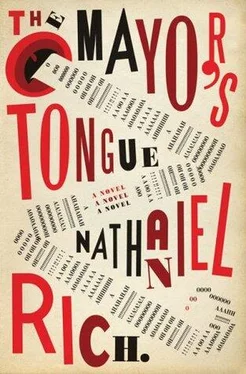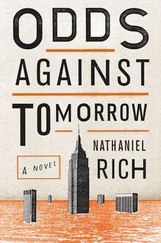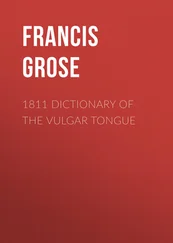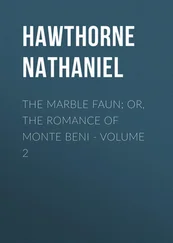"Thank you," she said, "for saving me from those awful children. But I hope you didn't scare them too badly." As she said this she noticed several small puddles on the boardwalk where the children had been standing moments earlier.
"I'm just gratified to be able to help you out, Ms. . Have we met, by any chance?"
"Ms. Chisholm. I don't think so. I'm pretty sure I would have remembered."
The man raised a platinum eyebrow. He gave her a wide feline smile and, somewhat abashed, relaxed his grip on her hand. The lopsided pair strolled along the boardwalk together. The sky was growing dark, and the vast piazza was already lit for night, illuminated by oval spotlights embedded in the pavement, and by the extraordinary tall bronze streetlamps, from which frosty globes hung like poisonous fruit. The expensive cafés lining the piazza thrummed with the crowds of vacationers and bankers just off from work at the stock exchange, conversing in languid, sardonic tones. A group of elderly men stood in a semicircle, their hands clasped behind them, speaking with pinched, declamatory gestures; a few feet away, a group of elderly women gossiped in their ankle-length housecoats.
"Of course, you don't need to call me Ms. Chisholm."
"That's fine! How about Agata? You see, I once knew someone named Agata, and you bear an uncanny resemblance to her. The same graceful, high cheekbones, the red-gold hair. . She was a frank, sophisticated woman."
Alice later told Lang that she was overcome by a vague, hazy calm. The excitement of the wharf drained from her like a dream upon awakening. "Agata," she said to herself.
"She was named after agate," said the giant. "The striped gem. The ancient Persian magicians used it to protect against fevers. I happen to succumb myself, from time to time, to the most savage fevers. You wouldn't believe. Fevers of the brain.
Now, I'm not one to put a whole lot of stock in ancient Persian wizardry. But dear sweet Agata did cure a few of my fevers. I don't mean anything vulgar by that, of course. But suffice it to say, she was a good woman to me. A strong woman." Spidery creases worried at his temples and it seemed to Alice that he might weep.
"I love the name, Agata," said Alice." I'd be honored if you called me that." She smiled, wanting to reassure the nice old man.
"What a dear child. Now, would you permit this old fellow to make sure you get wherever you're going safely?"
"It's a bit out of the way — a little antiquarian bookstore on a backstreet. It's called the Libreria Antiquaria—"
"Constantino Eakins."
"You know it?"
"Just follow me. You see," he said, "Agata. You see, Agata, I know this city pretty well."
His murderous outburst seemed distant, as if it belonged to some previous era of her life. She blamed her earlier anxiety on her dazed, melancholy state. When he had shown up on the boardwalk, that mood had vanished, replaced by a feeling that something strange and new had entered her life.
You can imagine what I thought when they showed up together at the bookstore," said Lang. "Through the window I spotted them. Their arms were linked and she was laughing. Positively twinkling . And her hair that day, I'llnever forget! It was a fantasy. I swear: it glowed red and gold. Meet my savior, she said, in her best dame-in-distress voice. Connie just grinned at me, and I admit there was something in that grin that gave me the chills."
Lang's jaw ticktocked uncomfortably. Eugene was beside himself— he had finished his coffee, and was jittery in his seat.
"On the way back from the piazza Eakins finally came out and told Alice who he was. She wasn't shocked at all, but only said, 'Oh, somewhere deep down I think I knew that.' Then the three of us sat around for several hours or so, Connie captivating Alice with stories about her father. In the sixties Abe was a passionate, virile man — though Alice laughed at the use of the word 'virile' to describe her father — zealous for adventure in obscure lands. Connie talked about a yearlong journey he took with Abe around the Adriatic Sea — interrupted by brief jaunts in Bari, Vlorë, and Corfu — aboard a dilapidated Slavic schooner. Abe was like a younger brother to Connie. He told how they once skirmished with a small band of nomadic mountain bandits outside of Tiranë, disputing the sacrifice of a terrified, bleating doe. How they once smuggled burlap sacks of silver ore over the Yugoslavian border with a band of Gypsies, who melted the metal for use in a religious healing ritual. How a victorious fight in a Dubrovnic bar led to the dismemberment of a Greek sailor.
"Miraculously, Connie emerged almost entirely unscathed and Abe suffered only a cut on his jaw. The fight had broken out after Abe asked the young girlfriend of one of the sailors to dance. Connie said she was beautiful: she wore a red polka-dotted bonnet and had a bright, heart-shaped face with eyes as round as the sun that was then rising, for it was dawn by the time the fight was over. This girl took pity on Abe. When they stumbled out into the port she left with them, and traveled with them all the way back to Trieste. Abe and she were married under an orange beech tree in a small town in the Carso, in a cliffside mansion overlooking the sea.
"Connie admitted that he recognized Alice on the boardwalk because she resembled her mother so closely.
"Alice was transfixed. It must have been difficult for her to imagine her dusty old father young and boisterous, let alone shattering a beer bottle over the head of a Greek sailor. But Abe rarely discussed Alice's mother, and she had certainly never heard the story of her parents' meeting. She begged Connie to stay and tell her more. He said, I wish I could talk to you further, and I will soon, but not now — I have to make it back up the Carso before morning. My friends expect me, he said.
"When Connie left, Alice slumped downstairs. She reminded me of her father then — the first flicker of disappointment and he takes to bed like an invalid. Her sadness was gone, but it had been replaced by something else, something shapeless: not melancholy so much as restlessness. When she came upstairs that night, she wanted to talk with me about her parents' love affair. She spoke about the pain of losing a great love too early — her mother had died when she was just a toddler. She told me that she had once fallen in love herself, but she was torn away so abruptly that her love remained just a wish, apparitional and feeble, attenuating with time. And she wondered whether maybe that was the best kind of love. The one that is snatched away before it can breathe and settle.
"On the way to dinner that night, Alice barely spoke. When we passed under a streetlamp, a tress of her hair, which had fallen loose from her forehead, appeared to have turned white. When I mentioned this to her, she complained that she didn't feel well and ran back in the direction of the bookstore. When I came home from dinner, she was gone. I never saw her again.
"I don't know what she's doing now, or why she ran off. But I'm certain I know where she is."
Around the time Rutherford left for Italy, Agnes began collecting seahorses. It strikes Mr. Schmitz as a peculiar development — his wife has never had a fish tank before, or any pet after the death of her childhood dog. She does, however, have a mania for reading the science section of the Sunday newspaper, and he supposes she has gotten the idea from an article on seahorses that ran the weekend of Rutherford's departure.
The piece, called "Seahorse Attitudes," profiled the world's leading authority on seahorses, the marine biologist Mollie Owen. Owen had opened, in New London, the first center for seahorse preservation, and had made several major discoveries so far. For instance, she said, many people know that seahorses are monogamous and that the male, not the female, gives birth. But she was the first to discover the method by which a seahorse chooses its partner, that a male seahorse eats a different diet when it is pregnant, and that a seahorse's death shortens the lifespan of its mate.
Читать дальше












